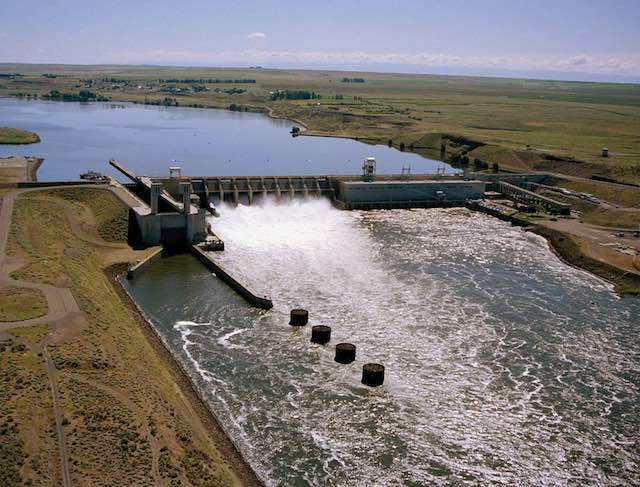forum
library
tutorial
contact

'Collaborative' Effort to Save NW Salmon Looks
Like Another Anti-Snake Dam Task Force
by Editorial Board
Tri-City Herald, July 25, 2021
|
the film forum library tutorial contact |

|
'Collaborative' Effort to Save NW Salmon Looks
by Editorial Board
|
 Idaho Power Co.'s Brownlee, Oxbow and Hells Canyon dams, located on the Snake River near the Idaho and Oregon border, have blocked a historic spawning route for steelhead and Chinook salmon since they were built half-a-century ago.
Idaho Power Co.'s Brownlee, Oxbow and Hells Canyon dams, located on the Snake River near the Idaho and Oregon border, have blocked a historic spawning route for steelhead and Chinook salmon since they were built half-a-century ago.
State leaders in Oregon had at one time pushed to reintroduce fish above those dams, but Idaho officials vehemently opposed the idea because it would be detrimental to electric power production and to farmers who rely on irrigation.
Hmm.
That sounds familiar.
In Eastern Washington, the effort to breach or remove the four lower Snake River dams has been relentless even though these dams actually allow fish to pass, unlike other Northwest dams that block fish habitat completely.
Many tribes, environmental and fishing groups are targeting the Snake dams in an effort to boost endangered fish runs -- as if getting rid of them is all it will take to help salmon recover.
And now there are concerns that what's been billed as a "collaborative" approach to restoring salmon by Washington, Idaho, Oregon and Montana will in fact be just another anti-dam task force.
The governors of all four states introduced the Columbia Basin Collaborative last year as a way to join forces to save the region's precious salmon.
But 19 of 22 seats that are not set aside for federal or state agencies will, in all likelihood, be filled by people who belong to groups already in favor of breaching the Snake dams.
This is unacceptable.
A committee so heavily weighted in one direction will have no credibility and its recommendations will be meaningless.
What's worse is that Oregon has a seat at the "collaborative" table, but filed a lawsuit asking the U.S. District Court in Portland to seize control of the Columbia River System Operations.
Kurt Miller, executive director of Northwest RiverPartners, told the Tri-City Herald that Oregon can't be a sincere partner if it is litigating behind the scenes.
"Oregon needs to be above reproach so participants have a chance at a fair and unbiased outcome," Miller said.
We agree.
Northwest RiverPartners is a nonprofit representing community-owned utilities, farmers, ports and businesses, and it is pushing for balance on the four-state group.
When the governors first launched the idea of the Collaborative, many Tri-Citians were hopeful that participants would take a holistic approach to restoring threatened and endangered salmon.
That means addressing pollution in Puget Sound, culvert repair and replacement, and habitat restoration outside of Washington state.
But as of right now it appears that breaching the Snake dams will be the laser focus of the majority, and any thoughtful, honest discussion of saving salmon will be undercut by an anti-dam agenda.
This, despite a four-year, comprehensive federal Environmental Impact Statement on the Columbia and Snake Rivers dams released last year that found removing the Snake dams would improve fish runs only slightly, while causing more harm to people and the environment.
The four lower Snake dams provide reliable electricity quickly when demand is high. Most recently, they were the backup power supply that kept air conditioners running nonstop during the recent extreme heat wave in the Northwest, which took the lives of close to 200 people in Oregon and Washington.
The Snake dams also provide irrigation and navigation so farmers can get their crops to the ocean.
Congressman Mike Simpson, a Republican representing the eastern side of Idaho, tried to find a way to compensate the region in his $33 billion federal plan to shut down the Snake River dams. He acknowledged the benefits the dams provide and believed the region should be compensated if the dams were breached.
But his plan has been rejected by his own state's legislature and by Idaho Republican Gov. Brad Little.
In February, Little said he remains unconvinced that breaching the dams is a "silver bullet" for salmon recovery and that, "Breaching the dams would have devastating impacts on Idahoans and vital segments of Idaho's economy," according to the Idaho Statesman.
Even with Little and Idaho lawmakers against breaching the dams, the Collaborative still will be too lopsided if more balance isn't brought to the group.
The divide over the Snake dams is easy to see, so it shouldn't be hard to even out the advocates and the opponents. If the governors want this group to be meaningful, they need to balance it out.
If the group's stance is predetermined, why waste time meeting?
learn more on topics covered in the film
see the video
read the script
learn the songs
discussion forum
